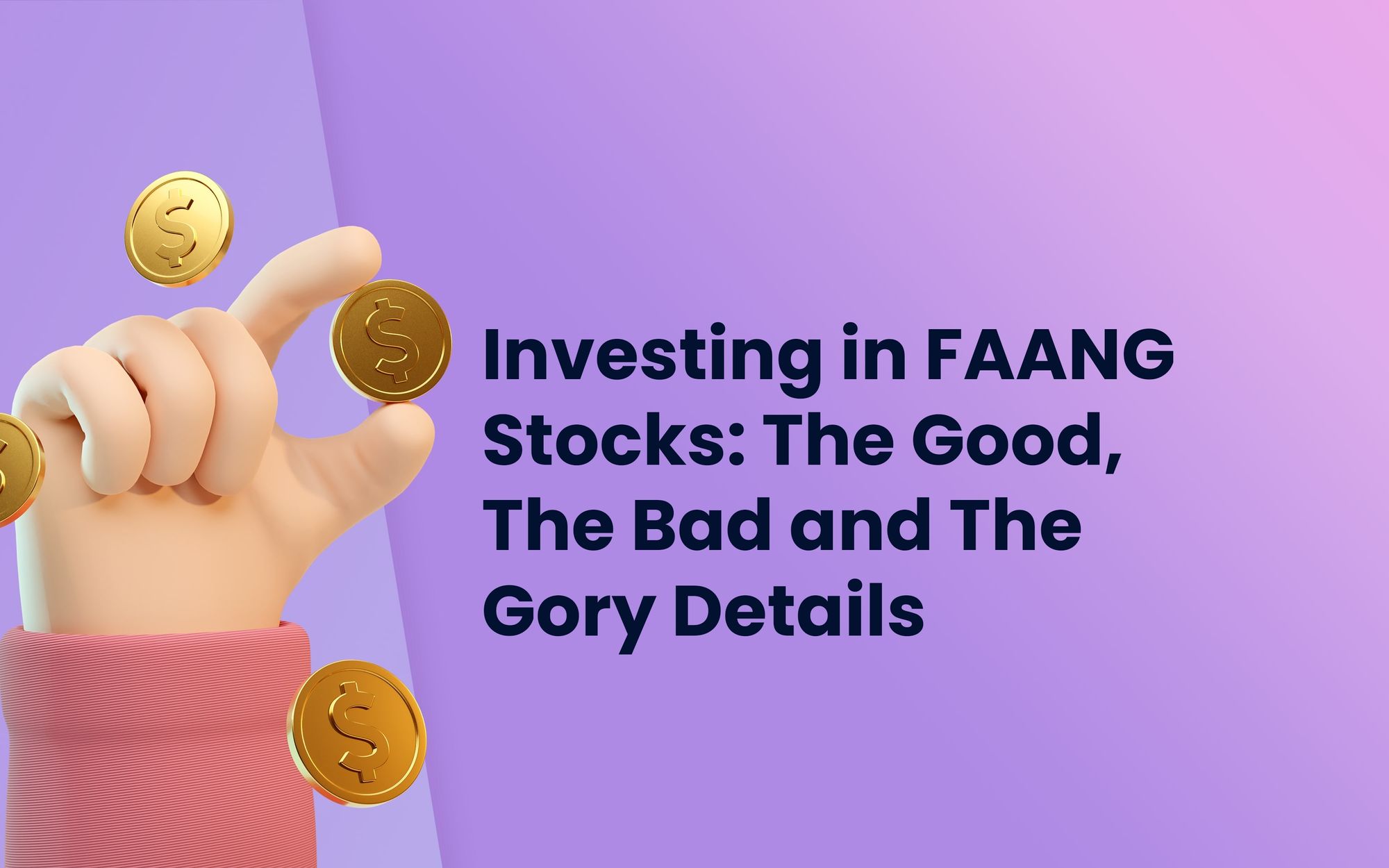Investing in FAANG Stocks: The Good, The Bad and The Gory Details
As a young investor, you may be tempted to invest in FAANG stocks. However, it's important to understand the good, the bad and the ugly before making any decisions.

There is no doubt that FAANG stocks have been on a tear lately, but should young investors jump on the bandwagon? There are pros and cons to investing in these tech giants, and it's important to understand them before making any decisions. In this post, we'll take a look at the good, the bad and the ugly of investing in FAANG stocks. So read on to find out if these stocks are right for you!

What are MAMAA or FAANG stocks?
Let’s talk about Big Tech that dominates the stock markets
By now, you are probably familiar with the term - FAANG. For the uninitiated, FAANG is
- Apple
- Amazon
- Netflix
Jim Cramer, the television host of CNBC's Mad Money, started talking up FAANG stocks in 2013 - hailing them as the most dominant companies in their respective industries. He started with FANG and eventually Apple was added in 2017.
Now there’s a new term that Jim has started talking about - MAMAA. These are:
- Meta (Facebook)
- Apple
- Microsoft
- Amazon
- Alphabet (Google)
Netflix seems to have gotten the axe after the questions about its business model, and the intense competition in the streaming services business.
You’ve already made a connection here - these are what many American politicians call Big Tech. The heavyweights of the tech industry and dominant players.
Anyhow, FAANG or MAMAA - what's the deal here? Why do these stocks get a fancy acronym while the other thousands don’t? Let's find out:

Are these stocks really worth it?
Investors in 2021 piled into big tech stocks - FAANGs especially were the group that got a lot of investor interest. Whatever the investment thesis, their meteoric rise in 2020-2021 was due to a mix of things - popularity, retail investor interest, increased business due to pandemic etc - which led to lofty valuations that were severely disconnected from reality.
We need to make one thing clear though - while these tech stocks were flying high, they are not similar to Gamestop - which was a completely different case.
FAANG/MAMAA stocks - are companies with real business, real assets and real value. But in the end the disconnect between the real value and the market value of these companies went awry, that their decline has led to many questioning if the market was in a tech stock bubble, with 2022 seeing these crashing down as much as 75% over their high prices.
Coming down from their lofty heights many tech stocks are closer than before to their real value, and many investors are asking - are they still investible?

But they are on a discount! Shouldn't you buy the dip?
There is an inherent risk of investing in stocks that were overvalued, but which are now on sale. Over the long term, these undervalued companies can grow innately, but there is no guarantee they will.Thus investing in any one of these stocks comes with its own set of risks and rewards. Just because they are ‘cheaper’ than before does not mean they are cheap.
Let’s look at an example here:
Say you are in the market for a new white t-shirt that normally goes for $20. But in the last one year, white t-shirts were in vogue after the latest kpop band delivered the smash new hit all draped in white t-shirts. So everyone wanted these white t-shirts and prices started climbing and went up to $100 a piece - 5x their value!!
But, today, the trend is a bit old and you can get the cool white tee for 40$ - that is a whopping 60% discount! So are you buying it at a good price?
While there is merit in buying stocks that are at a discount - the key question is discount to what price? If the price was inflated and disconnected from reality, a discounted price is not the only decision factor - rt?
So the answer to ‘should you buy these stocks on a dip?’ is very simple - if they are at or close to their fundamental value, their business is still relevant, the management is still stunning at executing etc - sure. Just do your own research.

How to invest in FAANG stocks?
So - this is NOT financial advice & hence, as we always say, figure it out yourself. Don’t go looking for tips on Reddit or Telegram.
What we can say is this - most investors who are starting out, the best way to invest in ANY stocks is through an index fund. An index fund gives the opportunity for investors to invest in the FAANG/MAMAA stocks, and diversify their money across more companies. There are many FAANG dominated ETFs that give you solid exposure to not just these companies but also some other solid companies.
There is a minor downside of investing in an index fund is that they lack the ability to be actively managed and returns are usually correlated as an average of the fund holdings.
If you don’t want to invest in an index fund but still want exposure to these big name stocks, then consider purchasing individual shares of those companies that seem most attractive to you. This requires a significant amount of research and patience though as there are risks involved with purchasing individual shares. Using a fractional platform will allow you to spread your investment across multiple stocks and diversify - which is a very important element of investing. As always, make sure you diversify - having only these stocks can put your portfolio at a risk of severe volatility if only these stocks wobble.

But why should you have an exposure to these Big Tech companies?
First, these stocks offer a high level of liquidity and transparency. In other words, you can buy and sell shares of these companies easily. And in spite of the insane drop from 2021 to 2022, some of these large caps are comparatively less volatile.
Second, these companies are solving relevant problems and are innovation powerhouses. The gains in these companies have been significant over the last decade and they have proven time and again that they can execute with excellence.
Third, many of these companies are not just very profitable, but also generate massive amounts of cash. They hold solid reserves that allow them to ride over the rough patches. Plus the extra cash gives them the opportunity to buy other companies or their own shares to support the stock price in turbulent times.
Lastly, they are dominant in their respective businesses. Most of them are leaders and have incredible lead over others in the same space. This market dominance translates into long term pricing power & hence profitability.
And the bad stuff about Big Tech? There surely is some dirt!
There are cautionary tales even for companies like these - sure they are relatively less volatile, but they aren't immune to market actions. A sell off in the tech sector affects these stocks as well.
Even after a crash, their valuations may not be fair. While it is true that different sectors determine ‘fair’ value differently, a Price-Earning Ratio (PE) that is reasonable is always preferred.
Another problem is these companies are eating into each other's markets. 5 years ago, things were simpler - Amazon was selling stuff, Facebook ran social media, Google built the search engine & Microsoft sold office software. Now apart from their core models, Microsoft runs a social media site (LinkedIn), Amazon sells ads on their platform, Google sells stuff on Google Shopping and Facebook is trying a bunch of other things in the Metaverse.
It is getting increasingly complicated to understand what their core business is and just the fact that these giants could get into a brawl with each other, could mean that one or more will end up with a bloody nose.

Is there something that can totally ruin the party for Big Tech?
One theme that gets discussed often is that some of these companies have become so big and dominant that there is concern about them being anti competition - and governments typically do not like these kinds of situations. There have been concerns from activists and politicians about the power that some of these tech companies have over, not just the market but also over population at large.
They can shape public opinion, make or break peace and harmony and create situations that can spiral out of control. Any action from the governments to break them or limit their operating space can lead to a massive shock to their stock.
On a milder note, regulatory oversight over their businesses could cap their cash advantage. It could limit them from deploying cash to buy out competing smaller companies as it can lead to monopolies.
Final word…
Big Tech gets lofty valuations, often when investors price them at high multiples based on their potential future businesses. While there could be some truth behind the addressable markets that may open in future, there is no guarantee that it will.
All said, these companies have some real solid, well loved and respected products. As a balanced long term investor, it makes sense to research them and add them to the portfolio. But make sure you also have other companies across sectors and industries - just limiting your portfolio to these much loved tech companies may not be a very wise move.
#diversify #investresponsibly
Read more: When is the Best Time to Start Investing?